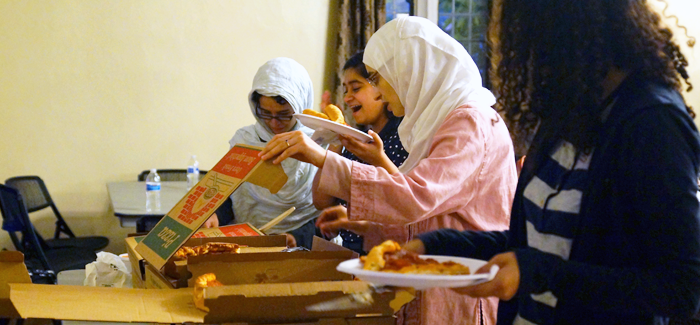Serving up pizza. (Photography by Minna Jaffery, ’15)
Muslim Students Association creates a welcoming atmosphere for those far from home during Ramadan.
During the ninth month of the Islamic calendar—the month during which worshippers believe the Quran was revealed to the Prophet Muhammad—Muslims around the world celebrate Ramadan. They fast from sunrise to sunset, abstaining from food and water as a means of understanding the lives of the less fortunate. It is a time of prayer and purification and deep reflection. At sunset every day, the faithful gather with their friends and families to celebrate Iftar, the breaking of the fast. Because the Islamic calendar is based on the lunar calendar, each Islamic month moves back approximately ten days every Georgian year. This year Ramadan began on June 30, with Eid Ul-Fitr, the celebration at the end of the Islamic month, predicted to fall on July 28. Because the beginning and end of Islamic months are based on the sighting of the new moon, the exact date is still unknown.
Ramadan during the summer poses unfamiliar challenges to many young Muslims. When I first began fasting at the age of 10, Ramadan took place in November, when days were many hours shorter and I didn’t worry about dehydration every time I stepped outside. There’s also the emotional strain.
[[{"type":"media","view_mode":"media_original","fid":"1798","attributes":{"alt":"","class":"media-image","height":"290","typeof":"foaf:Image","width":"460"}}]]
Dates. (Photography by Minna Jaffery, ’15)
Lena Ismail, a health educator on campus, says, “Ramadan, like any holiday, can be a lonely time to spend away from your family.” I, like many UChicago students, was spending this holiday away from my family for the first time. To console myself while eating alone at 8:30 p.m. or later, I bought a deep fryer, which I affectionately call my “fry daddy,” to make the traditional Pakistani snacks that my mother had sent with me. But my belief that I would feel lonely during Ramadan was mistaken. The
Muslim Students Association (MSA) held community Iftars every Monday and Wednesday of Ramadan, funded by student donations.
I went to an Iftar on a Wednesday night. In the west lounge of Ida Noyes, I was warmly greeted by the dozen Muslim students setting up chairs and tables and carrying in boxes of deep-dish pizza. “The MSA Iftars have become a Hyde Park institution for faculty, staff, community members, and their families. These diverse and inclusive Iftars bring together Muslims from all walks of life to share a meal and pray together,” Ismail says. The feeling of inclusion was palpable as students and their families filled the room, all greeted by hugs and welcomed into conversations. “The Hyde Park community has been completely welcomed by the University campus during Ramadan and beyond. The MSA students not only open their events to community members but they make an effort to build relationships with attendees,” Ismail says.
[[{"type":"media","view_mode":"media_original","fid":"1799","attributes":{"alt":"","class":"media-image","height":"290","typeof":"foaf:Image","width":"460"}}]]
Sharing a meal together. (Photography by Minna Jaffery, ’15)
As it grew closer to 8:24 p.m. (the time that the sun set that day), water and dates were handed out—one traditionally breaks one’s fast as the Prophet is said to have done. After a quick duaa, or prayer, students lined up in rows to perform the evening prayer together. Soon after, the noise level in the lounge swelled to a din of excited chatter that deflated as quickly as it began; students were voraciously devouring pizza after the 17-hour fast. Traditionally, families eat ethnic food for Iftar; pizza and chicken wings certainly seem to be traditional for hungry students. Though Muslims are allowed to eat throughout the nighttime hours, the initial meal after sundown is met with great anticipation.
After everyone had eaten seconds, the chatter began again. The group in Ida Noyes was a mix of undergraduates talking about the demands of their various internships and graduate students discussing their dissertations. Conversations were animated with requests for prayers and discussions of Iftars elsewhere in the city. Though this was only my first time at the MSA’s Iftars, it was clear that the community had formed a makeshift family.

